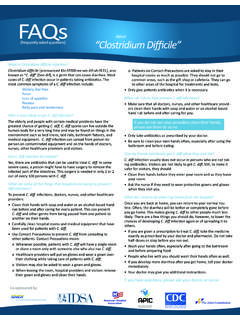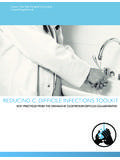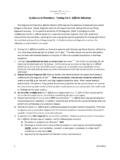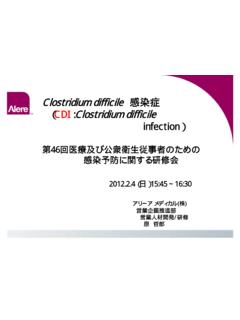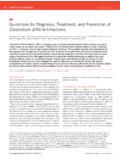Transcription of 2008 Pamphlet C diff - ICPSNE
1 Washing hands with Soap and Water Turn on water Apply soap Lather for 15 seconds rubbing all surfaces of hands and wrists Rinse under running water with fingers pointing down Pat dry with paper towel Turn off faucet with paper towel Additional information can be found at: 2008 ICPSNE , Inc. All rights Reserved CDI clostridium difficile Infection Patient Education Infection Prevention and Control CDI What is clostridium difficile infection? clostridium difficile (C. difficile ) is a bacterium or germ that normally lives in the gastrointestinal tract (stomach and intestines). The bacteria can produce toxins that cause diarrhea. Some people have C. difficile in their body, but are not sick from it. A new strain of C. difficile has developed which makes such large amounts of toxins that it causes people to have more serious illness. What are the symptoms of C. difficile ? Watery diarrhea Abdominal pain/tenderness Fever Loss of appetite Nausea What increases my risk for acquiring C.
2 difficile ? Taking antibiotics Having surgery Being in a health care facility for an extended period of time Having serious, underlying illness Advanced age If I have C. difficile , can it be spread? C. difficile is spread by stool. Any surface that becomes contaminated with stool may spread the disease. It can be spread from unwashed hands or from unclean items that are shared. When someone touches the dirty item and then touches his/her mouth, therefore ingesting it, he or she could get sick. Is there treatment for C. difficile disease? C. difficile sometimes resolves in two to three days after you have stopped taking antibiotics. It can also be treated with other antibiotics, such as Vancomycin and Flagyl. The strain of C. difficile that produces a large amount of toxin is harder to treat. What will be different? In the hospital you may be placed on contact precautions in a private room to prevent the spread of C. difficile . In Long Term Care (LTC) and Rehabilitation Facilities you may be on contact precautions and may have a roommate, but have a designated bathroom.
3 Healthcare workers will wear an isolation gown and gloves when providing care for you until you finish treatment and or no longer have diarrhea. Wearing a gown and gloves is added protection to clothes and hands to ensure germs are not spread to the environment and other patients. All healthcare workers must wash their hands before entering and when leaving your room. What else should be done? As always, all family members must wash their hands well with soap and water after using the bathroom and before eating Maintain good personal hygiene by showering and wearing clean laundered clothing. clostridium difficile is different from other germs in that if forms spores that can not be removed with an alcohol rub. Hands must be washed with soap and water. If clothes or bed linens become soiled with diarrhea, wash them separately in the washing machine with hot water, detergent, and bleach if fabric compatible. Machine dry if possible. While having diarrhea, clean the bathroom with a diluted bleach solution.
4 Be sure to clean any object that has been contaminated with stool; faucet handles, flush handles, door knobs. Clean and disinfect frequently touched surfaces often in your home, such as faucet handles, toilet flushes, bedrails, door knobs etc.
